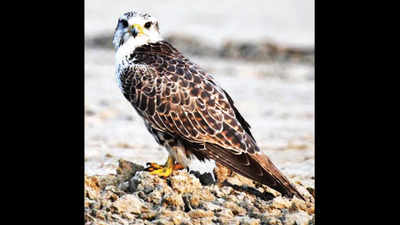- News
- City News
- jaipur News
- Rare migratory falcon sighted in death-scarred Sambhar Lake
Trending
This story is from November 26, 2019
Rare migratory falcon sighted in death-scarred Sambhar Lake
The endangered Saker falcon, Hungary and Mongolia's national bird, has been sighted among a new flock of migratory birds that arrived at Sambhar Salt Lake within two weeks of an avian botulism outbreak that killed more than 19,000 winged visitors.

Saker falcon at Sambhar Lake
Jaipur: The endangered Saker falcon, Hungary and Mongolia’s national bird, has been sighted among a new flock of migratory birds that arrived at Sambhar Salt Lake within two weeks of an avian botulism outbreak that killed more than 19,000 winged visitors.
The last time anyone had documented a sighting of the Saker falcon in the state was over four decades ago. But what would otherwise have been an occasion to celebrate is causing concern among conservationists and nature lovers because Sambhar still bears traces of the bacterium suspected to have triggered the botulism epidemic.
“Botulism is still there in the lake and can flare up again, given a feasible environment.Our biggest worry as of now is that there is no way to prevent migratory birds from coming to Sambhar as the area is too large,” ornithologist Asha Sharma told TOI.
A solitary Saker falcon, which is on the International Union for Conservation of Nature’s Red List, was seen at Sambhar last Friday.
Forest officials said they were doing everything possible to prevent a fresh outbreak of botulism in the country’s largest salt lake. “We have just had a meeting with a central team of experts on the measures that can be taken to prevent the infection from striking the new migratory birds that have been arriving. We will be strictly following these guidelines,” chief wildlife warden Arindam Tomar said.
‘Extreme care needed while burying carcasses’
Jaipur: Clostridium botulinum, which has been identified as the causal agent in the botulism outbreak, is an “anaerobic gram-positive, spore-forming bacterium”.
The bacterium releases toxins called botulinum, which cause muscular and nervous impairment in affected animals, eventually leading to paralysis-induced death.
“Since this bacterium flourishes in anaerobic conditions and forms spores that can easily spread through soil and water, extreme care needs to be taken while burying the carcasses of dead birds.
Water bodies that are more prone to develop anaerobic conditions can be aerated to prevent development of an environment where the bacteria could flourish,” ornithologist Sharma said.
The last time anyone had documented a sighting of the Saker falcon in the state was over four decades ago. But what would otherwise have been an occasion to celebrate is causing concern among conservationists and nature lovers because Sambhar still bears traces of the bacterium suspected to have triggered the botulism epidemic.
“Botulism is still there in the lake and can flare up again, given a feasible environment.Our biggest worry as of now is that there is no way to prevent migratory birds from coming to Sambhar as the area is too large,” ornithologist Asha Sharma told TOI.
A solitary Saker falcon, which is on the International Union for Conservation of Nature’s Red List, was seen at Sambhar last Friday.
Sources said there could be a couple of more birds from the raptor species among the mixed flock.
Forest officials said they were doing everything possible to prevent a fresh outbreak of botulism in the country’s largest salt lake. “We have just had a meeting with a central team of experts on the measures that can be taken to prevent the infection from striking the new migratory birds that have been arriving. We will be strictly following these guidelines,” chief wildlife warden Arindam Tomar said.
‘Extreme care needed while burying carcasses’
Jaipur: Clostridium botulinum, which has been identified as the causal agent in the botulism outbreak, is an “anaerobic gram-positive, spore-forming bacterium”.
The bacterium releases toxins called botulinum, which cause muscular and nervous impairment in affected animals, eventually leading to paralysis-induced death.
“Since this bacterium flourishes in anaerobic conditions and forms spores that can easily spread through soil and water, extreme care needs to be taken while burying the carcasses of dead birds.
Water bodies that are more prone to develop anaerobic conditions can be aerated to prevent development of an environment where the bacteria could flourish,” ornithologist Sharma said.
End of Article
FOLLOW US ON SOCIAL MEDIA










